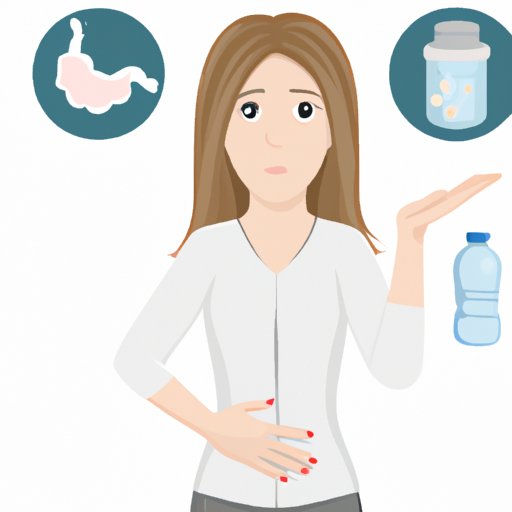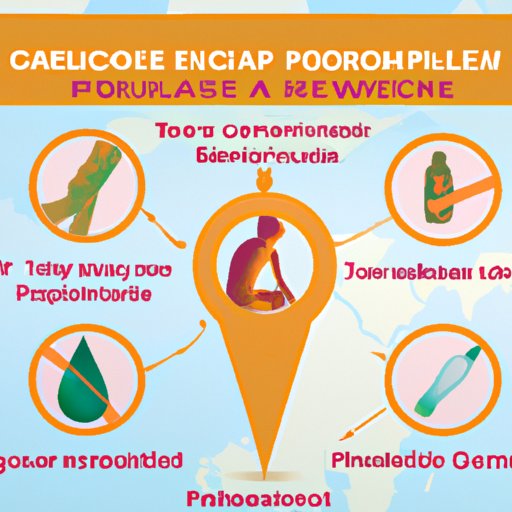
Introduction
Cholera is a highly infectious disease that is caused by the bacteria Vibrio cholerae. While it is not common in developed nations, it remains a significant problem in developing countries, particularly in areas with poor sanitation, crowded living conditions, and inadequate access to clean water. One of the most concerning aspects of cholera is its ability to lead to severe dehydration, which can be fatal if untreated. That’s why it is essential to understand the symptoms of cholera and recognize them early to initiate prompt treatment.
Understanding the Signs of Cholera: A Comprehensive Guide
The signs of cholera can range from mild discomfort to severe dehydration, which can cause organ failure and even death. Symptoms typically manifest within a few hours to five days after exposure to the bacteria. Common symptoms of cholera include:
- Severe diarrhea
- Loss of appetite
- Nausea and vomiting
- Severe dehydration
- Low blood pressure
- Increased heart rate
- Muscle cramps
- Dryness in the mouth, throat, and skin
One of the most critical aspects of identifying symptoms of cholera is to recognize the severity of dehydration. In its initial stages, cholera can lead to mild dehydration, which can cause fatigue, dryness of the tongue, and dry mouth. In severe cases, dehydration can be life-threatening, leading to weakness, sunken eyes, wrinkled skin, and a rapid decrease in urine production. If left untreated, cholera can be fatal in less than 24 hours.
The severity of cholera symptoms can vary depending on risk factors such as age and overall health. Children, elderly people, and individuals with weakened immune systems are at higher risk for severe symptoms of cholera.
Spotting Cholera Symptoms: What You Need to Know
It can be challenging to distinguish cholera symptoms from other digestive system ailments, such as gastroenteritis or stomach flu, which share similar symptoms. One of the most telltale signs of cholera, however, is the sudden onset of watery diarrhea that can quickly lead to dehydration.
Additional symptoms that can accompany diarrhea include abdominal cramps, nausea, vomiting, fever, chills, and fatigue. In more severe cases, cholera can cause shock, seizures, and other serious complications.
It’s important to suspect cholera in patients who experience severe, watery diarrhea, especially if they are in areas with reported outbreaks of the disease, have recently traveled to endemic areas or have had contact with someone infected with cholera.
A Quick Look at the Symptoms of Cholera
If you suspect that you or someone you know has been exposed to cholera, it’s essential to recognize the symptoms quickly. The most common symptoms of cholera include:
- Watery diarrhea that can lead to severe dehydration
- Nausea and vomiting
- Muscle cramps
Cholera Symptoms: Early Signs and When to Seek Medical Help
Cholera can progress rapidly, so it’s crucial to identify early warning signs and seek medical help immediately. Early warning signs of cholera infection include:
- Mild to moderate diarrhea that becomes severe within a few hours
- Abdominal cramps and pain
- Muscle weakness and fatigue
If you suspect that you or someone you know has been exposed to cholera, it’s critical to seek medical help right away. Severe dehydration caused by cholera can cause death in just a few hours, so rapid treatment is crucial.
If you experience severe, rapid-onset diarrhea in a cholera-endemic area or have recently traveled to one, seek medical attention as soon as possible. Your healthcare provider may prescribe antibiotics to help fight the bacteria and fluids to replenish lost fluids and electrolytes.
Cholera Outbreaks: Identifying Symptoms and Taking Precautionary Measures
Cholera outbreaks occur primarily in areas with poor sanitation, crowded living conditions, and inadequate access to clean water. Identifying symptoms of an outbreak early can help prevent the spread of the disease.
The most common symptoms of cholera that may indicate an outbreak include:
- The sudden onset of severe diarrhea
- Vomiting and nausea
- Muscle cramps and weakness
- Low blood pressure and rapid heart rate
Individuals living in or traveling to cholera-endemic areas can take precautionary measures to avoid contracting the disease. Avoiding raw or undercooked seafood and drinking only boiled or chlorinated water is essential. Washing hands frequently with soap and clean water and practicing good hygiene can also help prevent the spread of cholera.
Beyond Dehydration: What Other Symptoms Accompany Cholera?
Although dehydration is a hallmark symptom of cholera, other physical and emotional symptoms can also manifest. These symptoms may include:
- Headache and dizziness
- Increased heart rate and abnormal heart rhythm
- Anxiety and restlessness
- Muscle and joint pain
- Irritability and confusion
- Lack of tears or urine output
It’s essential to talk to a healthcare professional if you experience any of these symptoms, especially in combination with severe diarrhea, as they can be indicative of serious complications.

Cholera Symptoms: What Every Traveler Should Be Aware Of
Travelers to areas with reported cholera outbreaks or endemic areas are at higher risk of contracting the disease. To prevent cholera while traveling, it’s essential to avoid contaminated food and water sources. Some essential tips that every traveler should be aware of include:
- Drink only boiled or bottled water, or water that has been disinfected with chlorine or iodine.
- Avoid eating raw or undercooked food, particularly seafood, fruits, and vegetables that may have been washed in contaminated water sources.
- Wash hands frequently with soap and clean water, especially before eating, after using the bathroom, and after touching surfaces that may be contaminated.
If you develop symptoms of cholera while traveling, it’s essential to seek medical attention immediately. Early treatment can help prevent severe dehydration and serious complications.
Conclusion
Recognizing the symptoms of cholera and understanding the importance of taking preventive measures is crucial for avoiding severe complications. Symptoms of cholera can progress rapidly, leading to severe dehydration and even death if left untreated. If you suspect that you or someone you know has been exposed to cholera, seek medical help immediately. With proper treatment and preventive measures, cholera can be controlled, and the risk of severe complications significantly reduced.




